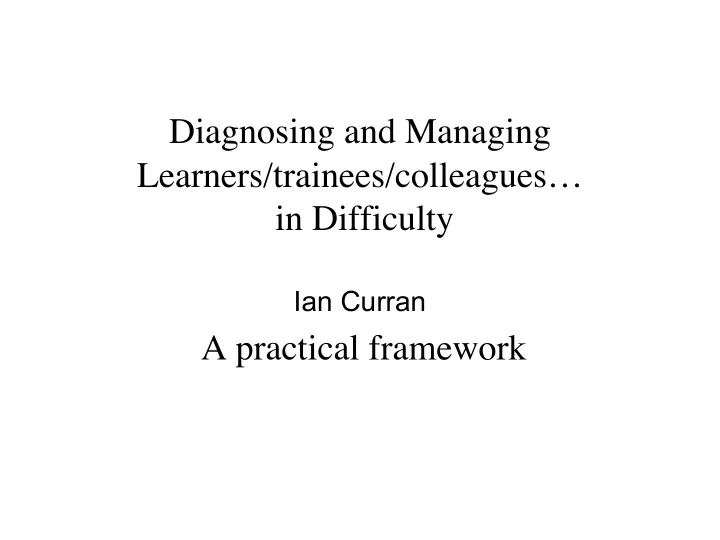

Diagnosing and Managing Learners/trainees/colleagues… in Difficulty Ian Curran A practical framework
Objectives • Explore this challenging area • Airing your concerns • Calling your vulnerabilities • Provide a diagnostic framework… • Offer some management solutions…
Initial thoughts?
How might you identify a trainee in difficulty?
See? Hear? Smell?
How do they make you feel?
disappointment anger frustrated guilty Red Mist depressed worry w h y m e ! ?
Key learning point Poor performance… …is a symptom not a diagnosis!
Key learning point Essential to explore underlying causes
National Clinical Assessment Service Domains Key learning point Health & Home Personality and behaviour Clinical ability Organisational/system issues
Some of the causes… • Personal behaviour • Capability – Complaints – Trained? – Lack of insight – Two left hands? – ‘Ward rage’ – ‘Bypass syndrome’? • Organisational • Health and Home – Appropriate supervision – Relationships – Trained trainers? – Mental & physical well being – Failing organisation? – Financial
Rapid Diagnostic Framework Observe behaviour Does it matter? No - relax! Why don ’ t they do it now? Yes! - do something Can they do it normally? If Yes Health? Home? If No Behavioural issue? Personality, capability, training issue? Organisational issues?
Key questions Key learning point • Does it matter? • Can they do it normally? • Why don ’ t they do it now?
Managing poor performers • Successful intervention depends upon identifying cause • Consider the four domains • Tell someone… Seek help early! • Be aware of resources and support systems • Solution follows from diagnostic framework • Don ’ t forget multiple problems can exist • Write things down, communicate openly.
You are not alone! Although it might feel like it!
Trainee as… • Learner… • Professional… • Employee… • Patient… • Citizen…
CEO OH Specialists OH Employee Counselling Dir HR Patient GP Counselling CD MD Trainee Clin Sup College NCAS Specialty Tutor Ed Sup Tutor Professional ADs TPDs College Pg Dns Learner Police Courts GMC HoS Chair STC? Citizen
Resources and support • Local, regional and national processes • Professional support • Identification and utilisation of available resources – Counselling – Psychological support – Career guidance – Mentoring – Occupational health – Retraining – Organisational change
Rapid Diagnostic Framework Observe behaviour Does it matter? No - relax! Why don ’ t they do it now? Feedback Yes! - do something Mentoring Occ. Health Close supervision Can they do it normally? If Yes Occ. psychology Health Pastoral support Home If No Train, retrain or redirect Behaviour Culture change, support, leadership resources Personality, capability or training issue? Organisational issues
Johari’s Window Things I know Things I don’t know Things you know Things you ? don’t know
Beware the intent behind a remark!
I’m ok, you’re not ok!
I’m ok, you’re not ok, but I’m not going to tell you!
I’m not ok…
I’m ok, you’re ok!
Feedback ‘recipe’… • Humanistic approach • Be in the moment • Listen… • Think… • Ask useful questions… • I’m Ok you are Ok… • …but we need to talk about stuff…
Key learning point Towards better performance - some guidelines • Be safe… does it matter? • Communicate early and effectively • Document interventions • Set clear objectives for trainee • Declare expected standards • Communicate support available • Consequences of non-compliance
Recommend
More recommend